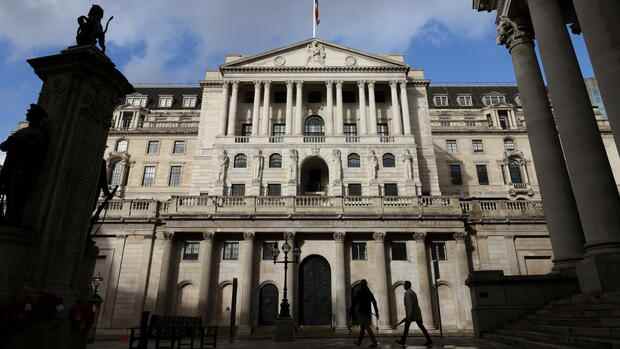The British central bank has announced interest rate hikes for “the coming months”.
(Photo: REUTERS)
London, Frankfurt The Bank of England (BoE) has once again postponed the turnaround in interest rates. The British central bank left the key rate on Thursday at the historic low of 0.1 percent. The decision in the Monetary Policy Committee was quite clear with seven to two votes.
The markets had firmly expected the first rate hike since the corona pandemic. After the decision, the pound fell 0.8 percent. However, the central bank promised to raise interest rates “in the coming months”. Their inflation projections suggest that the key rate will be at one percent by the end of 2022.
The monetary policy committee also held on to the purchase of government bonds amounting to 875 billion pounds by six votes to three. The US Federal Reserve announced on Wednesday that it would curb its bond purchases.
The Bank of England justified its reluctance above all with the economic uncertainty in Great Britain. The growth slowed in the third quarter, it says in the explanation. The supply chain bottlenecks had a dampening effect, and consumption was also weaker than expected in the summer. The central bank now expects 1.2 percent growth in the quarter.
Top jobs of the day
Find the best jobs now and
be notified by email.
In addition, she wants to wait and see how the expiry of the short-time work regulation at the end of September will affect the labor market. The central bank estimates that around one million employees were still on short-time work at the time.
Debate on the continuation of inflation
The economic worries outweighed the fear of inflation. The inflation rate in September was 3.1 percent, well above the long-term target of two percent. The central bank also expects it to rise to four and a half percent in November, and even to five percent in April.
But central bankers continue to view high inflation as a temporary problem. In the second half of 2022, it will decline significantly again, according to the committee’s report. According to the forecast, however, it will not reach the long-term target of two percent until the end of 2023.
Other central banks around the world have already tightened their monetary policy significantly – above all in the emerging countries. Brazil and Russia have each raised interest rates six times this year. Among the developed economies, smaller countries such as Norway, New Zealand and Poland have pushed ahead with rate hikes.
So far, the major central banks have given themselves significantly more time. “There are very different assessments of inflation risks among central banks around the world,” says Erik Weisman, chief economist of the US fund company MFS. Some signal a significant tightening of monetary policy, such as New Zealand – others are significantly more cautious, such as the Fed and the ECB. “Not all can be right.”
The long way to go for the ECB
ECB boss Christine Lagarde recently reaffirmed that the central bank intends to stick to its loose monetary policy for a very long time and that it considers an interest rate hike to be unlikely in the foreseeable future. However, the markets doubt that they can hold this line and are already praising an interest rate hike for next year.
Lagarde clearly rejected this at its press conference last week. On Wednesday, she stepped up again and emphasized in a speech that three conditions would first have to be met in order to raise interest rates. It is “very unlikely that these three conditions will be met next year”.
Before an interest rate hike, the ECB would first have to end its bond purchases. In December she wants to decide what to do next. Lagarde has signaled that the PEPP pandemic purchase program should expire at the end of March.
In addition to PEPP, there is an older purchasing program with the abbreviation APP. This currently amounts to 20 billion euros per month. Most experts expect the central bank to allow the APP program to continue beyond March and possibly increase it for the time being.
More: The US Federal Reserve is already curbing its bond purchases from this month

